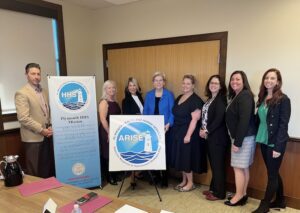Who is a member?
Our members are the local governments of Massachusetts and their elected and appointed leadership.

Sen. Elizabeth Warren, center, meets with Plymouth officials and grant recipients of the Plymouth ARISE program during an October visit to the town. (Photo courtesy Michelle Bratti/town of Plymouth)
Mass Innovations, From The Beacon, January 2025
As municipalities consider how best to spend opioid remediation funds, Plymouth’s addiction program has served as a model for other communities and has attracted the attention of local, state and federal officials for its work in addressing the crisis.
In early 2024, the town established Plymouth ARISE, a coordinated response to the crisis intended to reduce stigma around addiction and enhance services for residents. Over the past year, Plymouth has undertaken community outreach and engagement efforts, started a grant program, and helped other communities navigate the process for handling settlement funds negotiated through state agreements with opioid manufacturers and distributors.
By late 2024, Plymouth had spent $275,000 of the roughly $4 million it expects to receive over the next 10 to 15 years through the National Opioid Settlement and the Massachusetts State Subdivision Abatement Agreement. While infusing much-needed money into communities, the settlements have created policy and planning challenges for municipalities, given the complexity of the funding schedules and the uncertainty over how best to use the money in addressing a complicated public health epidemic.
Given all of the potential options, Plymouth ARISE (which stands for Plymouth Addiction Response and Improvement Strategies Effort) maintains a community-driven approach to its work, according to Emily Wilson, Plymouth’s assistant health and human services commissioner.
“As we talked about that deep pain and loss and grief that led up to the tragedies that created, essentially, this settlement, and the reason for these settlements,” Wilson said, “we wanted to develop a trauma-informed response that was restorative, and that reflected what people were denied during the collective trauma that they experienced with the opioid epidemic.”
The process started with reorganizing several town departments under a new Health and Human Services Department, following Town Manager Derek Brindisi’s arrival in 2022. The new department covers services for public health, veterans, seniors, the library, recreation, and animal control. Brindisi, who previously served as Worcester’s public health director, said Plymouth’s new department aims to bridge gaps in services and provide a more holistic response to interconnected needs.
“Historically, we have always had a department that focuses on infrastructure and departments that focus on public safety,” Brindisi said. “But, what we didn’t have was a department that focused on people. Whether tackling the opioid crisis, homelessness, veterans’ affairs, or other challenges, these efforts are fundamentally tied to health and human services.”
The new department made a presentation to the Select Board and, in January 2024, held two community meetings to solicit ideas for investing the settlement funds. Health and Human Services Commissioner Michelle Bratti and Wilson said they were moved by the personal stories of people affected by addiction, and by the good work already being done by local organizations.
“When we’re looking at why these dollars came to begin with, it really was a resounding cry to say, ‘enough,’” Bratti said. “We have an epidemic. People are dying, people are — if they’re not dying, they’re not living. How do we lift these human beings up to ensure that they don’t fall into these traps of addiction?”
Plymouth ARISE launched a competitive grant program, and in May it awarded roughly $50,000 each to five organizations: Bay State Community Services, Brockton Area Multi-Services, High Point Treatment Center, the Plymouth Public Schools, and To The Moon and Back. Wilson said the grant recipients are using the money to address different needs related to the crisis.
In June, Plymouth held a ceremony honoring the grant recipients, featuring keynote speaker Julia Newhall, the state’s director of opioid abatement strategy and implementation, and Everett Handford, regional director for the U.S. Department of Health and Human Services, and staff from Sen. Elizabeth Warren’s office. In October, Warren met with Plymouth ARISE officials and grant recipients to discuss the crisis and discuss ways to enhance their efforts.
Plymouth has also helped other communities address challenges around the settlement funding and its irregular payment schedules. Bratti and Wilson advise municipal leaders to listen to their communities, think creatively about solutions, and get the buy-in of a range of municipal leaders. They also urge smaller communities to consider using some of the funds to hire support.
Plymouth ARISE is now working with the local drug court and exploring workforce development options to help keep people on the recovery track. The program is planning additional community forums and a spring summit, and it has applied for a Mosaic Opioid Recovery Partnership Municipal Matching Grant from the RIZE Massachusetts Foundation. Officials haven’t yet decided whether to hold a second grant round, instead waiting to evaluate the data on year one, Bratti said.
“We want hard, data-driven information to propel us forward as we move through this process,” Bratti said.
For more information about Plymouth ARISE, please contact Michelle Bratti at [email protected], or Emily Wilson at [email protected].